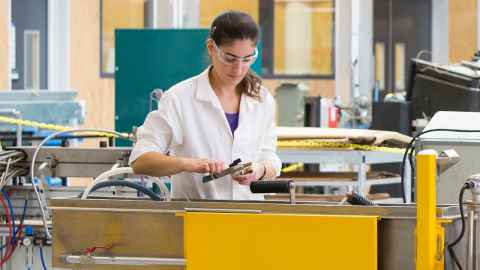Research centres
The Faculty of Engineering and Design leads and is closely affiliated with a number of well-recognised research centres.

Major research breakthroughs come from teams where the interplay of ideas from across disciplines can be combined to design innovative solutions. Our research expertise create a critical mass of groundbreaking activity in strategically important areas, bringing together expertise from wherever it is needed.
A facet of our faculty that we're exceptionally proud of is the degree of our cooperation and research interaction. Our research activities are not confined to our own disciplines; we encourage interdepartmental and cross-faculty collaboration. This ensures that our people have access to facilities and the creative, collaborative environment and expertise needed to enable them to be at the leading edge of international innovation.
Acoustics and Vibration Research Centre
The premier acoustics and vibration research group in New Zealand, committed to undertaking high-quality fundamental, theoretical and experimental research and seeks opportunities to create meaningful impact across the nation. Find out more
Centre for Advanced Materials Manufacturing and Design (CAMMD)
Addressing the global challenges of energy efficiency, low emissions and sustainability in manufactured products through increasing innovation and productivity within the knowledge-intensive, advanced manufacturing sector. Find out more
Centre for Automation and Robotic Engineering Science (CARES)
An interdisciplinary centre which is committed to creating new robotic, automation, and sensing (RAS) technologies that improve societal wellbeing, and inspire and train the next generations of RAS researchers. Find out more
Centre of Neural Engineering and Cell Technologies (CoNECT)
Focusing on the issue of the health and wellbeing of a rapidly growing and ageing population, with known health inequities for Māori, CoNECT seeks to advance and enhance human health by ‘connecting’ through neural integration with technology. Find out more
Circular Innovations (CIRCUIT) Research Centre
More than 90% of the materials used in the global economy are utilised only once, then thrown away. The Circular Innovations and Solutions Centre's look at all aspects of transition towards a circular economy. Find out more
Engineering Education Research Centre
The purpose of the Engineering Education Research Centre is to play a leading role in contributing to the body of engineering education research through teaching innovations and outreach activities. The EERC represents a clearly identifiable and unified research group to industry and the research community. Engineers shape our world, and we shape engineers. Find out more
Engineering for Natural Hazards Mitigation
Aims to develop analysis, design and decision-making methods to support the assessment of built environment components and systems in the context of natural hazards. Find out more
Future Cities Research Centre
The Future Cities Research Centre brings together researchers from across the Faculty of Engineering and Design and the University of Auckland to pursue, develop and disseminate transdisciplinary research focusing on climate change and social, cultural and spatial urban well-being. Find out more
Geothermal Institute
Established in 1978, this is one of the world's premier centres for geothermal research, education, training, testing and consulting. Find out more
Green Energy Engineering Centre
Driven by the purpose to carry out research to assist New Zealand in achieving a zero-carbon economy through increased investment in renewable energy. Find out more
Māori and Pasifika Engineering Research Centre (MPERC)
The Māori and Pasifika Engineering Research Centre (MPERC) will provide a hub for Māori and Pasifika researchers to support and nurture Māori and Pasifika research excellence. It will also assisting non-Māori/Pasifika within the faculty and research centre to meaningfully engage and collaborate with tangata whenua, further expanding and maintaining relationships. Find out more
MĀPIHI: Māori and Pacific Housing Research Centre
Committed to improving housing quality and supply for Māori and Pacific communities in Aotearoa New Zealand and the Pacific through impactful research that is manaaki-centred (uplifting mana) and based on tikanga Māori, Pacific values, Te Tiriti and Vision Mātauranga principles, expert knowledge and transdisciplinarity. Find out more
Te Pūnaha Ātea – Space Institute
A multi-faculty space science and engineering centre with the purpose of maximising opportunities that arise from the flourishing local space sector. Find out more
Transportation Research Centre (TRC)
Helping to lead and accelerate the transition towards a safer and more sustainable transport system that enables improved social, cultural, economic, and environmental outcomes in Aotearoa New Zealand and the world. Find out more
Water Research Centre
The Water Research Centre aims to make water infrastructure resilient to climate change, improve the performance of water and wastewater infrastructure, develop multi-scale integrated modelling frameworks to assess and mitigate future ecosystem threats, and to increase the amount of teaching and research done on water resource management, especially in water allocation, water demand forecasting and water trade. Find out more